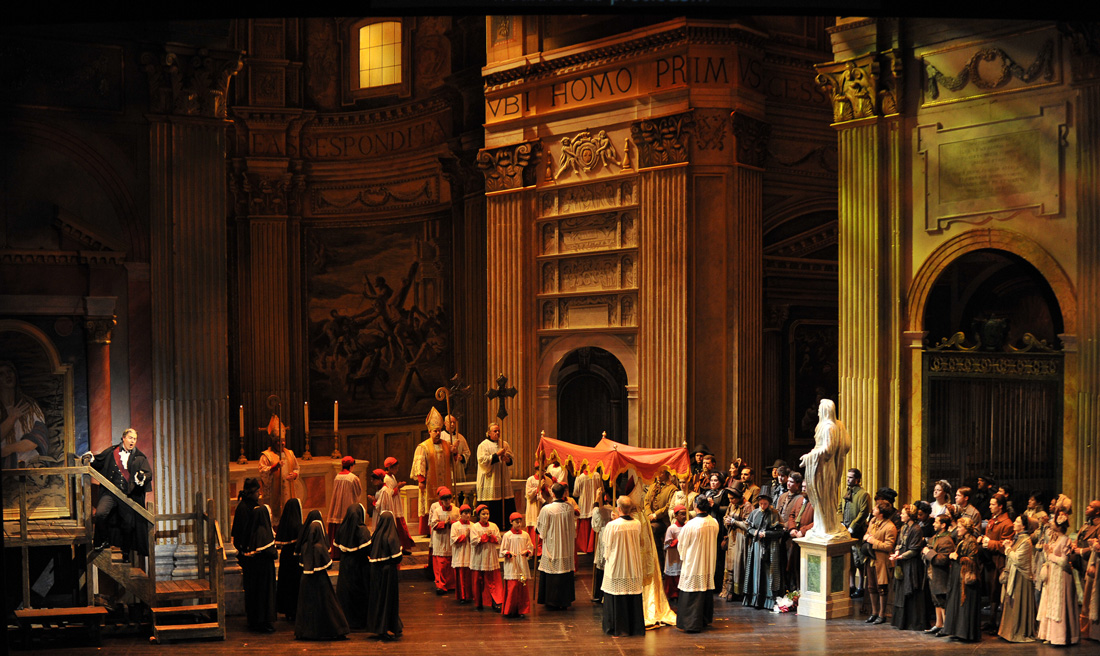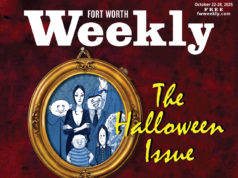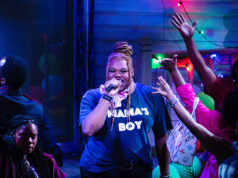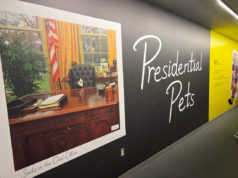I liked Fort Worth Opera’s Tosca so much I made my friends go see it.
I didn’t really make them go, but I did talk two rock musicians and a Fort Worth Weekly sales rep into humoring me. They didn’t all turn into overnight opera fans, but, well, I think the results would have made my dad proud.
I’m a first-generation Italian-American whose father moved to the states when he was 18 years old, so I got my fill of opera growing up. We listened to recordings of productions and of Pavarotti arias on the orange eight-track player given to my older sister as a Christmas gift one year but quickly commandeered by my father for family use. Believe me, I wasn’t instantly hooked on all those high Cs and fluttery strings. I was way into rock ’n’ roll. But when I hit my early 20s, not long after my beloved father passed away, I somehow gravitated back to the artform. Nostalgia was a big reason, no doubt, but I was also broke, lonely, and, most importantly, aimless. Listening to opera was just one of a few dozen things I did to, I guess you’d say, expand my horizons. (Reading Victorian poetry and experimenting with whiskey at 9 a.m. every day were some of my other horizon-expanding endeavors.)
I didn’t actually experience an opera in person until a few years later, and I’ve been a fan ever since. I’ve seen a few productions over the years, but I had pretty much lost the thrill –– until last month, when I took in Fort Worth Opera’s opening-night production of Tosca, one of four operas making up the company’s 2012 annual festival. I’ve already critiqued that production for the Weekly (“Loving Tosca,” May 16, 2012), but what I didn’t say then was that I felt that every young, open-minded person I know should experience the production.
I invited several friends to the show (I didn’t go with them). Three accepted and went to the last of FWO’s four performances of the Puccini classic, last Saturday.
Jordan Roberts, co-songwriter for indie-rock faves Calhoun, was the only one truly blown away. During the production (FWO loves social media), Roberts posted a photo on Facebook of the opening of Act III, when the curtain rises on a bruised sunset over a castle’s battlements, punctuated by an enormous statue of an archangel unsheathing his sword. Roberts captioned his post: “Tosca. It’s called culture. Ever heard of it?” Several cheeky responses followed, including “That’s a weird-looking strip club.”
Later that evening, Roberts texted me: “Dude. Loved it.”
The other two invitees, Weekly sales rep Candice Lester and Weekly contributor and bassist/songwriter Steve Steward (EPIC RUINS, Vorvon, Kevin Aldridge & The Appraisers), weren’t necessarily as impressed, though neither walked away feeling short-changed. Their quibbles seemed to stem not from the artform itself but from their 21st-century perspectives.
Pop-culture maven Steward, in particular, had a hard time suspending his disbelief, thrown off mainly by the sung dialogue. “I imagined [the characters] came from a country where that’s just how people talk,” he said. “In other words, they could’ve been griping about having to run a bunch of errands on a Saturday or a visit to the orthodontist, but they still would’ve sung their conversation.”
The tactic reminded Steward of a Transformers episode, “Carnage in C-Minor,” in which a handful of Autobots and Decepticons wind up on a planet whose inhabitants sing everything. “It is widely reviled as the worst episode of the series’ entire run,” he said.
Lester found the opera –– not the production, but the opera –– a little archaic and ill-suited for contemporary eyes and ears. “I know anything onstage is highly dramatized, but the whole thing seemed entirely over-acted,” she said. “I honestly found the plot a little cheesy, and though I understand that the story is set in the 1800s and [that the opera] premiered in 1900, the main characters seemed to be caricatures of traditional gender roles. The males were all brooding horn-balls, and Tosca was portrayed as insecure and jealous, though she did stab Scarpia to death, which was pretty hardcore.”
What was undeniable about FWO’s Tosca was the artistry. “The sets were amazing, and as far as I could tell, the singing and music were spectacular,” Steward said. “Hannibal Lecter wouldn’t have any reason to eat anybody from this production.”
Lester was equally wowed on that point. “The instrumentation was beautiful,” she said. “The sets were incredible, and the grand scale and artistic detail were impressive. … Bass Hall is gorgeous as a whole, the staff was all very helpful, and the lobby bar poured a stiff vodka-soda.”
Lester had never been to the opera before and was expecting a Hollywood-ized version of operagoing: that is, lots of old, rich, white people. And while the opera typically draws a lot of those kinds of folks, FWO’s Tosca last Saturday attracted a lot of young people beyond our group, though they were mostly white.
I don’t know what the other newbies there thought, but my friends all said they’d go again. They’ll have that opportunity next year, when FWO will present La Bohème, The Daughter of the Regiment, Ariadne auf Naxos, and Glory Denied.












